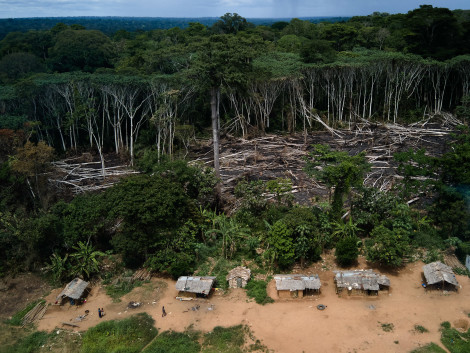

News | 12.05.2023
We are relaying an article by Plinio Sist, Director of the Forests and Societies Unit at CIRAD. The original version of the article, published on May 9, is available on the Reporterre website.

On April 19, the European Parliament adopted the regulation on imported deforestation related to "zero deforestation" supply chains. Large companies will have to comply by December 2024, small ones by June 2025, and demonstrate that the products they would have imported or exported from the European Union (EU) have not contributed directly or indirectly to deforestation.
Initially, the products concerned are palm oil, cattle, soy, coffee, cocoa, wood and rubber, as well as derived products (such as beef, furniture or chocolate). These products were chosen as priorities because they have been identified as the main drivers of deforestation in producing countries. Based on the fact that the EU is responsible for 16% of global deforestation, due to these imports of raw materials, the spirit of this regulation is to ensure that European consumers are no longer responsible for deforestation in the world despite themselves.
The aim is also to fight against the deforestation of tropical regions, which have lost 420 million hectares of forest in the last thirty years. If it is undeniable that this measure is necessary and that we must welcome this historic decision, its effectiveness to fight against deforestation and degradation of tropical forests is far from being acquired. Indeed, there is still a big unknown: the aid that will be provided by the EU to producers so that they can change their practices and be in line with this new zero deforestation regulation.
What about aid to small producers?
Indeed, if in the preamble of the text of the regulation, the European Commission clearly commits to work in partnership with producer countries to help them address the root causes of deforestation, neither the amount of this aid nor its implementation in coordination with the implementation of the regulation in producer countries are clearly specified.
The text focuses mainly on the processes of implementing the regulation from a legal and juridical point of view, and thus gives the impression that it is essentially a question of setting up a system of control of traceability of the products concerned rather than helping the producing countries to set up sustainable and long-lasting production systems in line with the zero deforestation regulation.
However, the effectiveness of this regulation in terms of the fight against deforestation will depend essentially on the capacity of producing countries, and particularly small producers, to change their agricultural practices. While large producers will have no problem meeting the requirements of this regulation to continue exporting to Europe without changing their practices, the same cannot be said for traditional agriculture. Indeed, the deadline set by the regulation is December 31, 2020, which means that any crop grown on deforested land before this date will not be considered as the result of deforestation and the products grown on these plots will be able to be exported to the EU without difficulty.
Buy-back of properties
If we take the case of soybeans from Brazil, the EU's main supplier, the cultivated area currently covers 34 million hectares for an annual production of 137 million tons. The potential area that can be cultivated for soybeans without deforestation by reclaiming former pastures, for example, is 44 million hectares and therefore in line with the EU's zero deforestation regulation, since these are areas that were deforested before 2020. The large soybean producers will therefore have no problem supplying the European market, which imports about 35 million tons of Brazilian soybeans per year, or about a quarter of its annual production and a third of its exports.
These figures clearly show that Brazil can easily meet the EU's demand without deforesting a single additional hectare. All they have to do is buy up, for example, pastureland from deforestation before 2020 from small farmers and convert it into soybeans. This purchase of small farmers' properties, which is currently quite common, could then be exacerbated and force them to deforest other land to plant other pastures. Indirectly, this soya crop will have caused deforestation without being taken into account by the zero deforestation regulation.
Palm oil is a similar example to soy, since the peak of deforestation related to this crop took place more than twenty years ago in Malaysia and Indonesia, and these two countries will have no problem exporting this product without generating new deforestation. Since today most of the oil palm plantations are located on former deforested lands. This regulation therefore shows important limits as to its real capacity to fight effectively against deforestation. It will not be sufficient. More than ever, it is urgent to promote mutual cooperation with producer countries to help them change their production methods in a profound way and to direct this aid towards small farmers, who are the most fragile in the face of this new regulation. Without this cooperation, this new zero deforestation regulation will have very little effect on deforestation rates and will simply contribute to giving Europeans a false good conscience about our share of responsibility for deforestation.